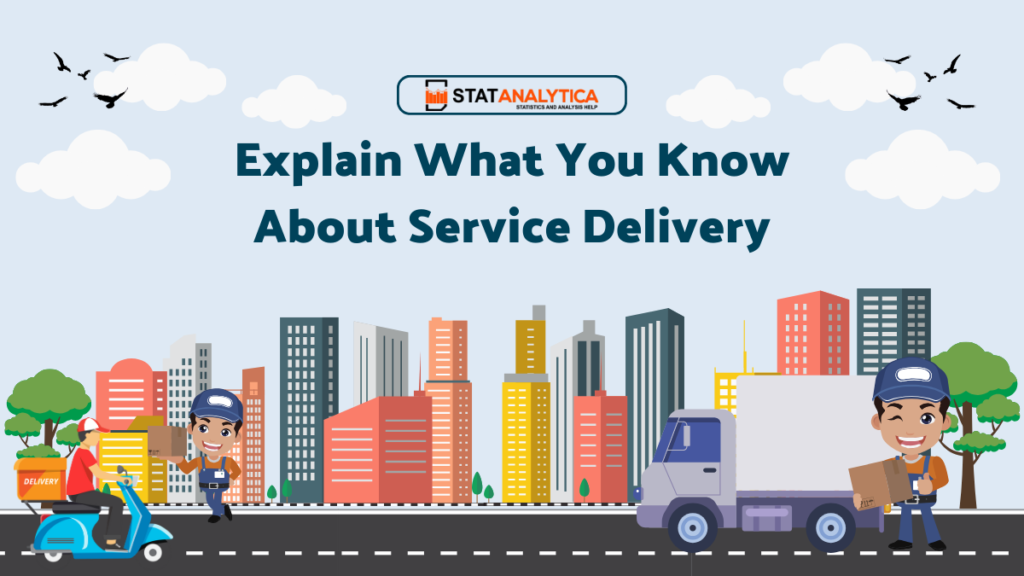In the area of business, service delivery stands as a crucial cornerstone for success. It’s not just about providing a product or service; it’s about how well you deliver it to your customers. Imagine ordering your favorite meal from a restaurant. Beyond the taste of the food itself, what makes the experience truly satisfying is how efficiently and courteously it’s delivered to your table. That’s the essence of service delivery – meeting customer needs with excellence. In this blog, we’ll explain what you know about service delivery, explore its components, discuss its significance, and offer strategies for mastering it effectively.

What Are The Components of Service Delivery?
Table of Contents
- Understanding Customer Needs: Service delivery starts by really knowing what your customers need and desire. It’s about empathizing with their desires, preferences, and pain points.
- Designing Appropriate Services: Once you grasp what your customers need, the next step is to tailor your services to meet those needs effectively. This involves crafting solutions that are relevant, reliable, and convenient.
- Delivering Services Effectively: This is where the rubber meets the road. Effective service delivery requires seamless execution, timely responses, and a commitment to quality at every touchpoint.
- Monitoring and Evaluating Performance: Service delivery doesn’t end with the transaction; it’s an ongoing process. Regularly monitoring and evaluating your performance allows you to identify areas for improvement and ensure continued customer satisfaction.
What Are The Three Models Of Service?
- Traditional Models: Historically, service delivery relied heavily on face-to-face interactions. Think of a local mom-and-pop store where the owner knows each customer by name.
- Digital Service Delivery: In today’s digital age, technology plays a pivotal role in service delivery. From online shopping platforms to mobile apps, digital channels offer unprecedented convenience and accessibility.
- Hybrid Models: Many businesses are adopting hybrid models that blend traditional and digital elements. For instance, a brick-and-mortar retailer might offer online ordering with in-store pickup options.
What Are The Factors Contributing To Poor Service Delivery In South Africa?
Technological Advancements
In today’s digital age, technological advancements are revolutionizing service delivery. From AI-driven chatbots to data analytics, businesses are leveraging technology to streamline processes and enhance the customer experience.
For example, ride-sharing apps like Uber and Lyft use GPS tracking and algorithms to match drivers with passengers in real-time, ensuring efficient and convenient transportation services.
Likewise, big online stores such as Amazon use fancy math to guess what customers might like, suggesting things they might want to buy. This makes shopping easier and helps them sell more stuff.
Customer Expectations
As consumers become increasingly tech-savvy and empowered, their expectations for service delivery are reaching new heights. They demand convenience, customization, and responsiveness from businesses.
For instance, customers expect seamless omni-channel experiences, where they can interact with a brand across multiple touchpoints such as websites, mobile apps, social media, and physical stores.
Companies like Apple excel in meeting these expectations by offering integrated services across their ecosystem of devices, allowing customers to seamlessly transition between devices while maintaining a consistent experience.
Organizational Capabilities
The effectiveness of service delivery heavily relies on the capabilities and resources of the organization. This covers many different things, like the tools we use, the skills of our team, and how we do our work.
For example, a company with robust IT infrastructure and well-trained customer service representatives is better equipped to handle customer inquiries and resolve issues promptly.
Likewise, organizations that invest in continuous training and development programs for their employees cultivate a culture of excellence and professionalism, which positively impacts service delivery.
Regulatory Requirements
Compliance with regulatory standards is imperative in service delivery, particularly in highly regulated industries such as healthcare and finance.
For example, doctors and hospitals have to follow strict rules like HIPAA to keep patients’ info safe. Likewise, banks must obey laws like GDPR and PCI DSS
Non-compliance with these regulations not only exposes businesses to legal liabilities but also erodes customer trust and tarnishes their reputation. Therefore, organizations must stay abreast of regulatory changes and invest in robust compliance programs to uphold the highest standards of service delivery.
Explain What You Know About Service Delivery: Importance of Effective Service Delivery
- Customer Satisfaction and Loyalty: Exceptional service delivery fosters customer satisfaction and loyalty, driving repeat business and positive word-of-mouth referrals.
- Brand Reputation and Competitiveness: Having a great reputation for how well you serve customers can make your brand stand out from others, giving you an edge in the market.
- Revenue Generation and Business Growth: Happy customers tend to spend more money and tell others about your business, which helps you make more money and grow steadily.
What Are The Challenges in Service Delivery?
- Communication Barriers: Miscommunication or language barriers can hinder effective service delivery, leading to misunderstandings and dissatisfaction.
- Resource Constraints: Limited resources, whether financial or human, can pose challenges in delivering consistent, high-quality service.
- Quality Control: Maintaining quality standards across all service touchpoints can be challenging, particularly as businesses scale or expand into new markets.
- Managing Customer Complaints and Feedback: Dealing with customer complaints and feedback requires tact, empathy, and a commitment to swift resolution.
Strategies for Improving Service Delivery
- Investing in Training and Development: Equip your workforce with the skills and knowledge they need to deliver exceptional service consistently.
- Embracing Technological Innovations: Leverage technology to streamline processes, enhance efficiency, and deliver a more personalized customer experience.
- Gathering Feedback from Customers: Make sure to ask customers for their opinions and really listen to what they have to say. Their feedback is like a treasure trove of ideas to make your service better.
- Keeping an Eye on How You’re Doing: Set up ways to measure how well your service is doing, like tracking numbers and goals. When you see areas where you can do better, tweak your methods to make improvements.
Case Studies/Examples
- Zappos: Renowned for its legendary customer service, Zappos built its brand on a foundation of delivering happiness to customers through personalized interactions and hassle-free returns.
- Amazon: Amazon revolutionized service delivery with innovations like Prime two-day shipping and one-click ordering, setting new standards for speed and convenience in online retail.
Conclusion
Let’s conclude the topic- explain what you know about service delivery. In today’s hyper-competitive business landscape, mastering service delivery is more critical than ever.
By understanding customer needs, designing appropriate services, and delivering them effectively, businesses can foster customer satisfaction, build brand loyalty, and drive sustainable growth.
Embracing technological innovations, investing in training, and actively listening to customer feedback are key strategies for staying ahead of the curve. Ultimately, excellence in service delivery isn’t just a goal; it’s a journey of continuous improvement and innovation.


